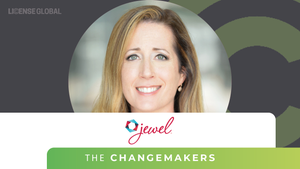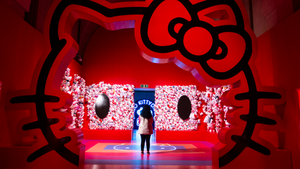NYC Licensing Summit Discusses Retail Disruption, Importance of Influencers and More
NORTH AMERICA--The 3rd annual NYC Licensing Summit took place on Tuesday, February 20 and hosted a variety of experts in licensing, entertianment, social media and more.
April 6, 2018

The NYC Licensing summit gathered executives, IP holders, and industry veterans to discuss the future of the business.
NORTH AMERICA—The third annual NYC Licensing Summit took place on Tuesday, Feb. 20, and hosted a variety of experts in licensing, entertainment, social media and more.
Highlights included:
Retail is Now A Personal Experience
 During the opening Keynote, Retail Today—The Current Landscape and What’s Ahead, Dana Telsey, founder, Telsey Advisory Group, broke down where the business is thriving, and what businesses need to pay attention in order to survive in the ever-changing market.
During the opening Keynote, Retail Today—The Current Landscape and What’s Ahead, Dana Telsey, founder, Telsey Advisory Group, broke down where the business is thriving, and what businesses need to pay attention in order to survive in the ever-changing market.
Telsey noted that the “health of the consumer” is strong thanks to a low unemployment rate and higher disposable income in all tax groups. Still, Telsey warned retailers and licensors of how to execute its approach to consumers. The shopping experience is no longer about the purchase alone.
“It is how the time is spent that will create the memory, not just buying the goods,” says Telsey.
Retailers are not just tracking the spending preferences of Millennials, either, but now also Gen Z, says Telsey. Noting how Millennials have more spending power, and looking for influencers and bloggers for references: “it’s all about social media,” says Telsey. “The world today is big and small. Trends move more virally.”
However, engagement is crucial to retail. Department stores are “in the midst of transformation.” To Telsey, shopping malls are now “community engagement centers," citing Sephora’s makeup classes and Lululemon’s yoga classes at their brick-and-mortar places.
“You have to marry the activity of doing to the activity of buying,” she says.
What retailers need to watch out for is the rapid rise of e-commerce, what Telsey called “the invisible threat." Niche e-commerce sites like TheRealReal and rental stores like Rent The Runway have made its mark at retail.
To Telsey, there are three pinnacles of success, project innovation, speed of execution and management.
The future of retail lies in “ization” of product—think 3D printing and virtual dressing rooms. A successful brand, according to Telsey, “has to “do what it says, and says what it does.”
Influencing Everyday Bro
Meanwhile, during the panel Influencing the Buy: Tapping into the Power of Social Influencers, Gil Eyal, chief executive officer, HYPR, opened the session with a brief look at successful (and unsuccessful) influencer-based marketing campaigns.
During his presentation, Eyal highlighted Samsung’s partnership with the YouTube channel Unbox Therapy, which he cited as being successful because his content was already in line with the brand and his reach was primarily consumers that were either into the latest trends in technology or were looking for a new phone. The campaign, which received roughly 6.1 million views on YouTube, also showcased Eyal’s key point of what makes influencer marketing the right decision for a brand: relatability.
Following Eyal’s presentation, Ross Misher of Brand Central took the stage with Kevin Gould of Kombo Ventures and YouTuber and social media influencer Jake Paul.
In the presentation, Paul touched on how the YouTube audience in general is more sophisticated than ever, and how he believes that kids today are finding themselves earlier on since they have access to so much more than previous generations.
Like Eyal, Paul noted how influencers are unique because they’re more relatable and explained how most influencers create authentic relationships with their audiences and are truly devoted to the everything they’re behind. He also explained that influencers have a “leg up” because they’re constantly creating content, which is ideal for promoting content.
“I’m super connected to my audience, so having something in stores is a big deal,” Paul said. “When I went to Walmart to showcase the posters [from Trends International], I made it a thing, like I’m a kid from Ohio and I went to Walmart all the time, but then I became a No. 1 selling poster and it was a bit of an inspiration story that you can chase your dreams.”
In addition, Paul explained the inspiration behind creating Team 10, his team of digital influencers.
“When I was 18-years-old and getting started in the YouTube and influencer space, I knew I wanted to create an empire,” says Paul. “I said to myself, ‘what if I can’t make videos anymore?’ I wanted to create an ecosystem where I would bring in talent under me, incubate their careers and help them to create and build their followings, as well as how to work with brands, monetize their audience and how to learn from some of the mistakes I’ve made along my rise to fame.”
Paul closed out his discussion talking about the future of retail, where he cited experiential retail as the next step forward.
“You need a reason for people to come into the stores, because everything is so easy to get on Amazon,” Paul said. “Experiencing an awesome moment inside of the store and being able to interact with and see the new products, is what will really draw people into retail.”
Retailers Look to Ramp It Up
A panel of retail heavyweights discussed the need for an accelerated concept, manufacturing and distribution process when a brand goes viral at the panel Need for Speed.
Moderated by Jennifer Sullivan, president, memBrain, the panel focused on the challenge of forecasting popular entertainment properties and having enough foresight to produce branded, fan-centric content once the properties become hits. The group explained that adapting to the new development cycle and aggregating social media can be the difference between retailers striking while hot and missing out on trends all together.
“We’re looking to interpret pop culture zeitgeist,” says Brian Mann, vice president, head of licensing and new business development, Loot Crate. "It’s a distinct point of view that feels personal.”
One way retailers hope to bridge the divide is by closely monitoring content creators, whose social media accounts and interests might shed light on upcoming storylines and trends.
“In a perfect world, if you can let licensors see what’s in the story, it’s a goldmine,” says Cindy Levitt, vice president, general merchandise manager, Hot Topic and BoxLunch.
The Face of the Gamers is Changing
A panel of gaming industry leaders talked about who the gamer is now, and what they’re looking for in the gaming experience at the panel, The Evolving Gaming Ecosystem.
Moderated by Naz Amarchi-Cuevas, head of licensing, Sybo Games, the panel shared how gamers of all age interact with their products. All agreed gaming has evolved since its introduction to the consumer market decades ago.
“It’s not just a kid playing a video game anymore,” says Jennifer Staley, vice president, licensing, Bioworld Merchandising. “It’s vast.”
“Our fans live and breathe these games,” says John Friend, head of “Halo” consumer products, Microsoft. “They’re always looking for something new.”
The profile of the gamer has evolved. No longer the loner playing games in the dark, gamers are “now more social than ever,” says Staley.
Gaming is also a multi-generational product, something licensors should recognize.
“It’s no longer just an overview,” says Friend. “You’ll have to get down to franchise specific. You’ve got to get to a deeper level.”
One way licensing is making its mark on gaming is through online streaming channels such as YouTube and Twitch, the latter Ubisoft is collaborating with.
“By adding a button onto the channel, fans can go directly to the gaming company to buy licensing product," says Sarah Buzby, vice president, consumer products, Ubisoft. “You have to be careful. You don’t want to overwhelm them.
The Most Mature Generation Yet?
In the closing keynote, The Story of Me – Insights into Kids Today, Pam Kaufman, chief marketing officer and president of consumer products, Nickelodeon, and Sujata Luther, executive vice president, consumer insights, Nickelodeon detailed exactly how kids are different from previous generations, the current generation gap between parents and children and diversity.
First and foremost, “kids are smart,” says Luther. Due to this, they also have an “unbelievable level of confidence” and are well informed of the world around them. For example, after surveying kids about the election in 2016, 10-year-olds responded that they believed they should be allowed to vote because “they have the experience.” Furthermore, Nickelodeon found that 90 percent of children believe they can do anything they want to or can figure out how to accomplish their goals alone without parents or teachers. Luther also explained how children are also interested in both being good and doing good and cited how children are becoming activists for what they believe in.
On the home front, Nickelodeon found that children and parents are spending more time together, with many children saying they would rather spend a birthday with their parents than their best friend. This is notable because children are also beginning to help with purchasing decisions in their households. According to Luther, about 50 percent of kids know what their parents make, and their parents agreed, and half of the respondents also noted that they also know when their parents get paid. Furthermore, a third of the respondents said they know how much their house is worth (or how much rent their parents pay) and 43 percent of parents say their kid was involved in the car they were going to buy.
Finally, Luther and Kaufman touched on diversity, which has helped spark a number of Nickelodeon series, such as “Nella the Princess Knight” and “Loud House.”
“Everyone is aware that America is the most diverse it has ever been,” says Luther. “By 2043, the majority of the country will be minorities. What we’re seeing, however, is that everyone wants to be viewed as an individual and people want to understand who they are.”
Other key presentations included executives from Merch by Amazon, Redbubble, Warner Music Group, Aéropostale and many more.
The day closed with a special ceremony honoring the 19 women named as License Global’s 2018 Influentials, all of whom have had a significant and lasting impact on the brand licensing business.
The NYC Licensing Summit is developed by License Global magazine, part of the Global Licensing Group at UBM, and presented in partnership with LIMA, the brand licensing industry’s leading trade organization.
Sponsors supporting this year’s event include Authentic Vision, Boy Scouts of America, BrandComply.com, Dependable Solutions, JPatton, Line Friends, Licensing Brands Inc., OpSec, SKP NY and Trevco.
For the full program and list of speakers, visit www.nyclicensingsummit.com
Read more about:
NYC Licensing SummitYou May Also Like






